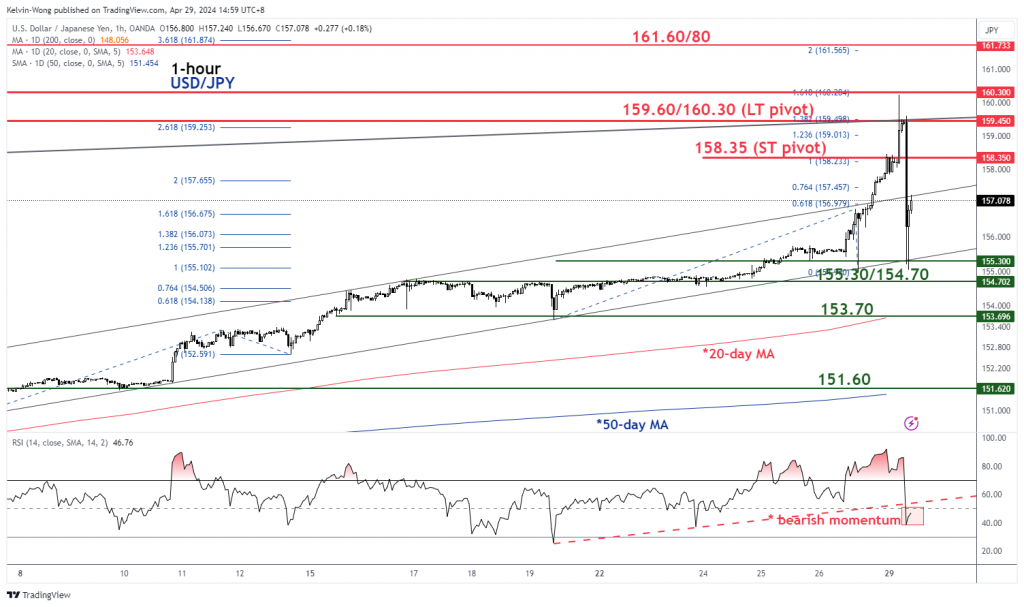- USD/JPY extended its rally to hit 159.60 key long-term resistance (also the April 1990 secular swing high).
- Today’s Asian session’s swift upmove in USD/JPY has led to an increase in its volatility condition which increases the risk of FX intervention.
- Abrupt intraday movement in USD/JPY that wiped out earlier intraday gains has the hallmark of a suspected FX intervention.
This is a follow-up analysis of our prior report, “USD/JPY: Persistent JPY bearish trend intact despite growing intervention risk” published on 26 April 2024. Click here for a recap.
Last Friday (26 April) price actions of the USD/JPY continued its march higher to close the US session with a new 34-year high at 158.35 (+1.7% daily gain) in light of a stubborn inflationary trend in the US as the core PCE price index (excluding food and energy) for March stood unchanged at 2.8% y/y and surpassed expectations of 2.6% y/y that put the highly anticipated US Federal Reserve’s dovish pivot narrative at the start of the year in great jeopardy.
On the flip side, the Bank of Japan’s recently concluded monetary policy decision last Friday lacked the “decisive punch” to shore up the persistent JPY weakness trend in terms of communications as BoJ Governor Ueda remarked in the press conference that the weak JPY has not had a big impact of underlying inflation in Japan (via imported inflation) which has reduced the odds of an interest rate hike in the next BoJ’s meeting in July.
159.60 key long-term resistance has been reached with increased volatility
Fig 1: USD/JPY major trend as of 29 Apr 2024 (Source: TradingView, click to enlarge chart)
Recently, Japanese key Ministry of Finance (MoF) officials have highlighted that they are watching the FX market with a sense of “urgency” and stressed abrupt market movements as their key concerns in light of potential interventions to pause the JPY weakness.
An abrupt movement can be termed as an increase in volatility. In today’s early Asian session, the USD/JPY has jumped up by +1.5% (230 pips) to hit an intraday high of 160.23 within 3.5 hours from the start of the session.
This latest set of movements seen in the USD/JPY has caused its 4-week moving average of its weekly range indicator (a measurement of volatility, considering the highest and lowest price points rather than closing levels) has jump up significantly from 1.43 printed last week to a current intra-week value of 3.19. (see Fig 1).
Therefore, an increase in the volatility condition of USD/JPY has increased the risk of FX intervention.
Large speculative players’ net bearish positioning on JPY hit an extreme level
Fig 2: Commitments of Trader large speculators’ net positioning in JPY futures as of 22 April 2024 (Source: Macro Micro, click to enlarge chart)
Based on the latest data Commitments of Traders data as of 22 April 2024 (compiled by Macro Micro), the aggregate net bearish open positions of large speculators in the JPY futures market in the US (after offsetting the aggregate positions of large commercial hedgers) have increased to -359,063 contracts (net short), its lowest level in almost 17 years with -374,536 contracts recorded on 25 June 2007 (see Fig 2).
Since large speculators have committed a relatively high amount of net bearish open positioning on JPY via the futures market, a real FX Intervention by Japanese authorities at this juncture may trigger a “panic” short covering of such leveraged short positions which in turn might cascade into an abrupt liquidity squeeze and negative feedback loop movement into the USD/JPY at least in the short-term horizon.
Wild intraday swings below 159.60 key long-term pivotal resistance
Fig 3: USD/JPY short-term trend as of 29 Apr 2024 (Source: TradingView, click to enlarge chart)
After skyrocketing to today’s Asian session intraday high of 160.23, it has erased its intraday gains within one hour to record a current intraday loss of -0.87% (-3.2% from intraday high to low) at this time of writing.
These abrupt short-term movements have given rise to the suspected footprints of actual FX interventions by Japanese authorities, so far, no official confirmations from MoF due to a public holiday in Japan today.
Watch the 158.35 key short-term pivotal support and break below 154.70 near-term support may trigger a further potential short-term downward spiral to expose the next intermediate supports at 153.70 (also the 20-day moving average) and 151.60 (50-day moving average) (see Fig 3).
On the other hand, a clearance above 158.35 negates the bearish tone for a retest on the 159.60/160.30 long-term pivotal resistance area.
Content is for general information purposes only. It is not investment advice or a solution to buy or sell securities. Opinions are the authors; not necessarily that of OANDA Business Information & Services, Inc. or any of its affiliates, subsidiaries, officers or directors. If you would like to reproduce or redistribute any of the content found on MarketPulse, an award winning forex, commodities and global indices analysis and news site service produced by OANDA Business Information & Services, Inc., please access the RSS feed or contact us at info@marketpulse.com. Visit https://www.marketpulse.com/ to find out more about the beat of the global markets. © 2023 OANDA Business Information & Services Inc.





